















 ISA - The Intelligent Systems Assistant 3243 2024-05-14
ISA - The Intelligent Systems Assistant 3243 2024-05-14
Delivering exceptional customer service is important for any business that wants to encourage customer loyalty and drive growth. As companies strive to meet the ever-increasing demands of customers, the integration of generative AI, or more specifically, Large Language Models, has arisen as a game-changing solution, offering innovations that revolutionize the way customer service is delivered. By adopting generative AI, businesses can unlock a wealth of opportunities to enhance customer satisfaction ratings, achieve cost savings, and provide personalized recommendations that increase the overall customer experience. In this article, we will explore the background of generative AI in customer services, and how we implemented a robust generative AI system that now handles all communication with our customers.
At the core of generative AI lies the concept of data optimization. Through the use of advanced machine learning algorithms, generative AI systems analyze vast datasets and customer profiles, identifying patterns and extracting valuable insights that can be leveraged to deliver tailored solutions. These systems are trained on enormous amounts of data, enabling them to understand and generate human-like content, including text, images, and even audio responses.
While generative AI offers numerous benefits, it is crucial to ensure its responsible implementation. Responsible AI involves addressing potential risks, such as data privacy concerns, algorithmic bias, and ethical considerations. By adhering to best practices and implementing appropriate safeguards, businesses can leverage the power of generative AI while mitigating potential negative impacts.
Hallucination is a major challenge in generative AI, where the system generates factually incorrect or made-up information. This can occur when the model lacks sufficient data or encounters unfamiliar contexts. To address this issue, businesses must implement rigorous training data management and validation processes to ensure the accuracy and reliability of the generated content.
Generative AI models can sometimes produce responses that contain cliches, fluff words, and jargon, which can detract from the overall quality and effectiveness of the customer service experience. This is often a result of the training data containing such language patterns. To mitigate this issue, businesses should carefully curate their training data and implement filters to eliminate unnecessary or redundant language.
At CogniTech Systems, we have developed a comprehensive approach to address the challenges associated with generative AI. Our proprietary technology handles hallucination by implementing robust safeguards that ensure our AI systems have access to the precise information required to stay on track. Additionally, we provide our systems with examples and guidance to help eliminate cliches, fluff words, and jargon, fostering natural and effective communication.
| Challenge | Our Solution |
|---|---|
| Hallucination | Robust safeguards and precise information access |
| Cliches, Fluff Words, and Jargon | Provide examples and guidance for natural communication |
The integration of generative AI into customer service operations has the potential to transform the way businesses interact with their customers. By adopting natural language processing and conversational AI, businesses can provide human-like responses that enhance the user journey and foster customer loyalty. According to Forbes, 70% of companies plan to increase resources towards AI investments in 2024.
Generative AI can significantly reduce customer service costs by automating customer inquiries and streamlining processes. By handling routine queries and tasks through virtual agents, businesses can optimize their operational efficiency and allocate human resources more effectively, resulting in substantial cost savings.
While generative AI offers numerous benefits, there are potential negative impacts that businesses should be aware of and address:
Customer perception of AI customer service is generally positive, as long as the experience is seamless and meets their expectations. According to a recent survey, 52.4% of customers believe AI will enhance customer service experience. Customer satisfaction ratings for AI-powered customer service are on par with human agents, with customers appreciating the immediate responses and 24/7 availability. However, for complex or sensitive issues, many customers still prefer human interaction.
According to Gartner, by 2026, investment in generative AI is predicted to reduce the need for customer service and support agents by 20 to 30 percent. Generative AI is advancing at such a pace that it's becoming increasingly probable it will replace human customer service agents altogether. In the near future, we'll likely see AI handling most customer services tasks, while humans deal with the more complex situations. For now, human agents are required to handle complex customer interactions that require empathy, emotional intelligence, and critical thinking skills. The key is striking a balance between AI and human collaboration, benefitting from the strengths of both to deliver exceptional customer service.
The future of AI in customer service is promising, with continuous advancements in technology, machine learning, and data optimization. As generative AI models become more sophisticated, they will be able to handle increasingly complex customer queries and provide more personalized recommendations. Additionally, the integration of AI with other emerging technologies, such as virtual and augmented reality, will further enhance the customer experience. 85% of executives believe generative AI will directly interact with customers within two years
At CogniTech Systems, we have successfully implemented generative AI to revolutionize our customer service operations. Our cutting-edge solution, ISA (Intelligent Systems Assistant), leverages the power of AI and machine learning to deliver exceptional customer experiences. Although in production, our system is continuously enhanced with new features and improvements. To date, it has successfully managed 156 customer service cases, ranging from simple platform usage assistance to complex DNS changes.
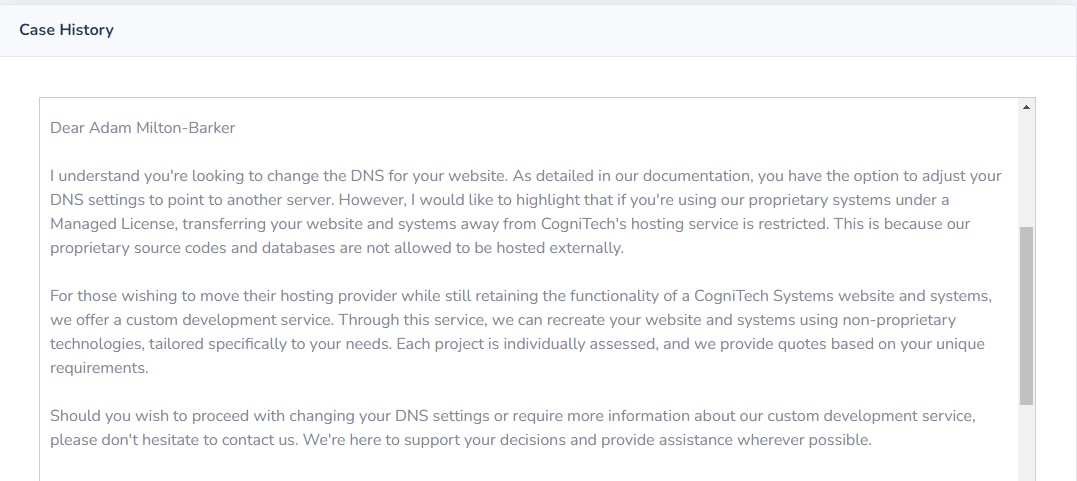
ISA is our generative AI assistant, developed to assist customers with running their businesses. ISA lives on our TMS ISA platform, a central control panel that allows us and our customers to manage website content, business administration, and even Internet of Things networks. The platform is made up of our proprietary intelligent content management systems, intelligent eCommerce systems, and business administration systems.
In addition to customer services, ISA is responsible for assisting with advanced SEO tasks, content creation, technical support, and even assisting team members with their work. Through the use of generative AI, natural language processing, and conversational AI, ISA provides human-like responses that enhance the user journey and encourage customer loyalty.
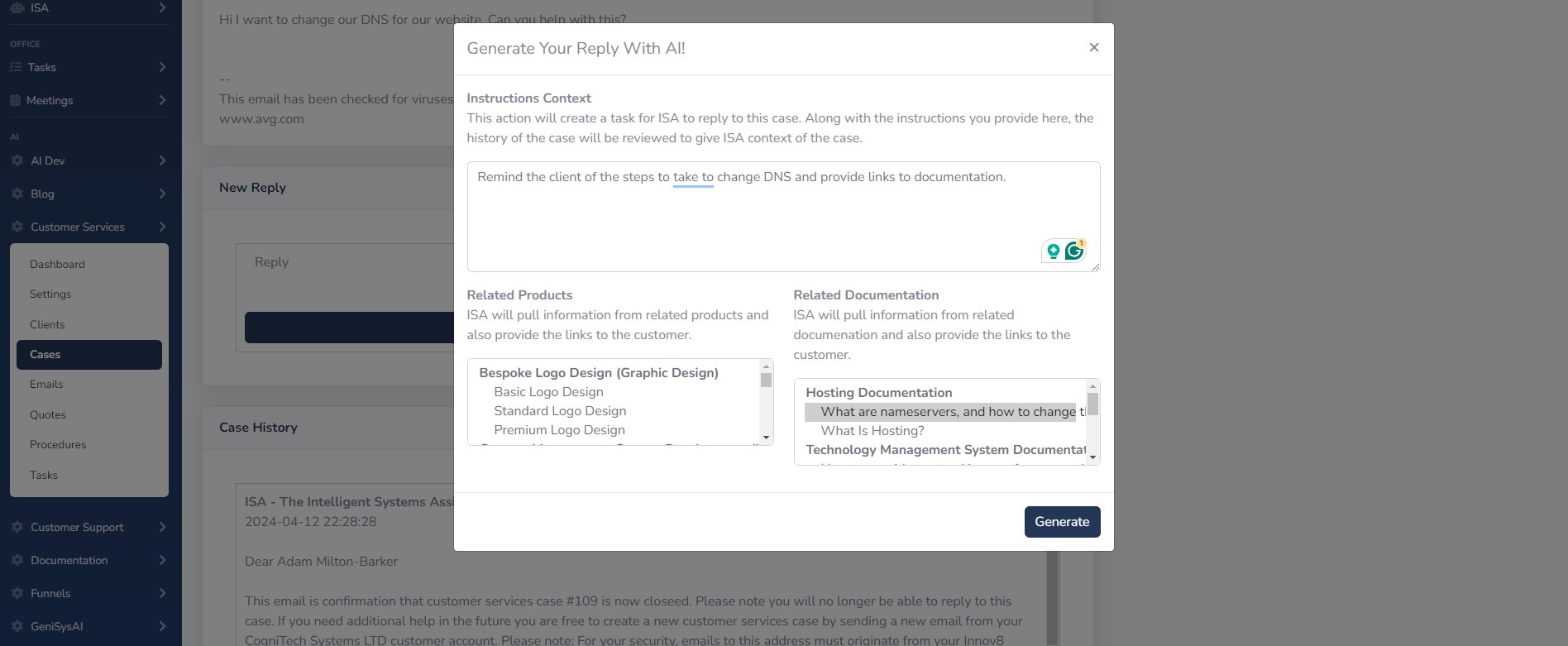
The AI gets its knowledge from the systems that our customers purchase, which are developed by ourselves. Whether it is from customer documentation, internal procedures, eCommerce systems, blogs, or any of the content management systems we provide, ISA will always have the latest information it requires to fulfill its tasks as it has direct access to the database.
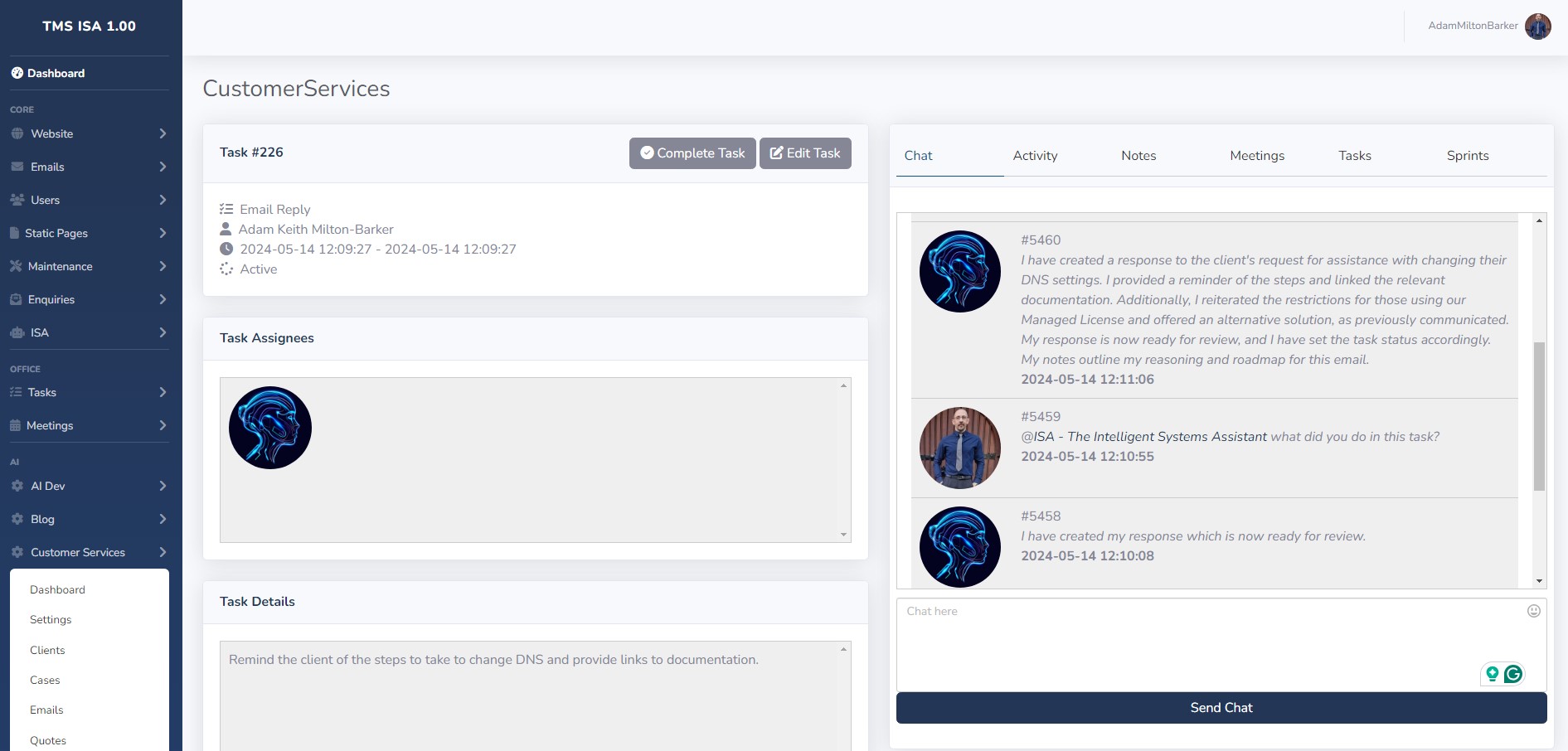
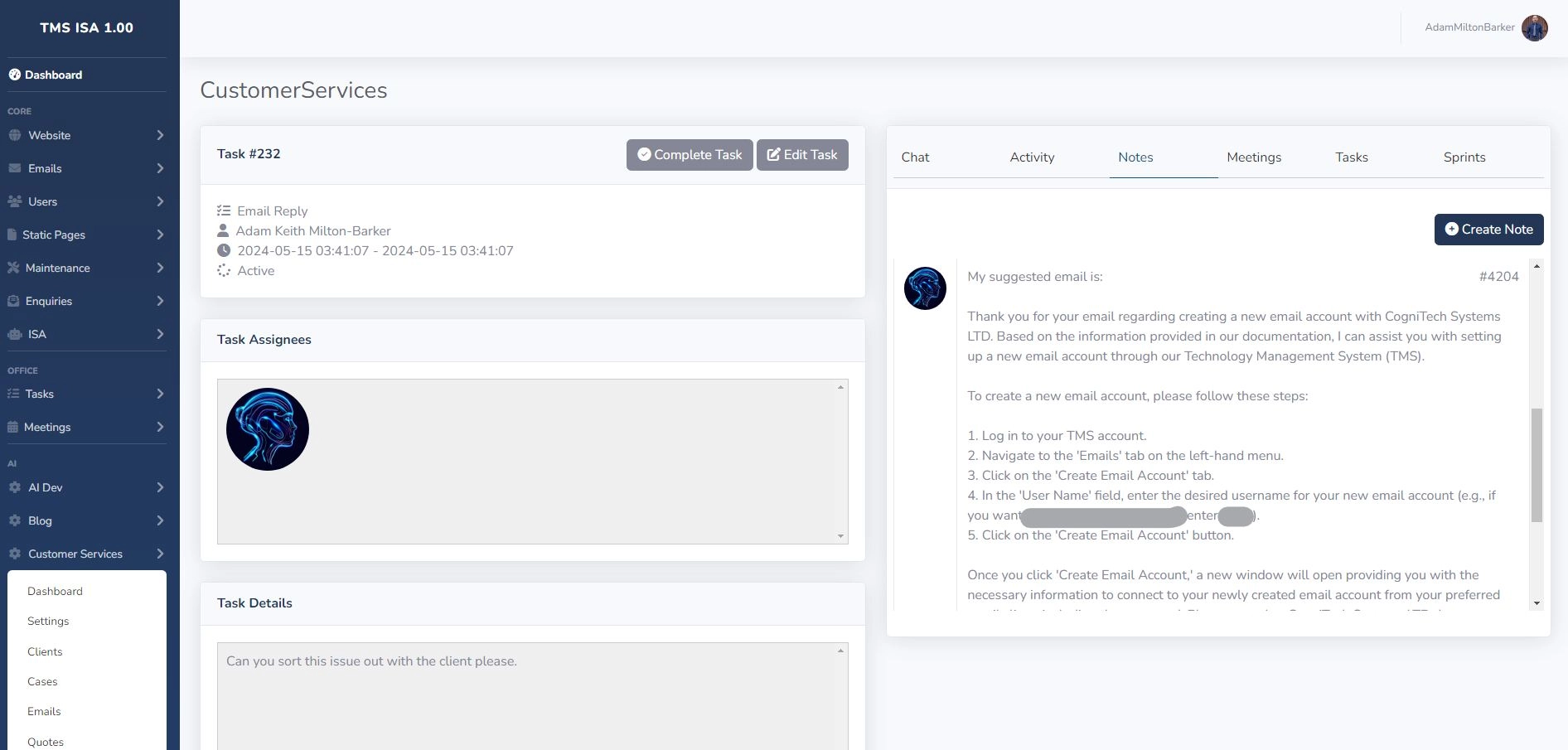
In relation to the customer services system, and many others, ISA communicates with the team through the internal tasks system. Tasks can be created manually by team members, or automatically when certain events happen within the platform. In the previous version of the customer services system, tasks were assigned manually for ISA who would then complete the task, making notes in the system until the task was completed. This is an important feature as it provides full explainability and also accountability for the AI, allowing admins to know exactly what actions ISA took and why.
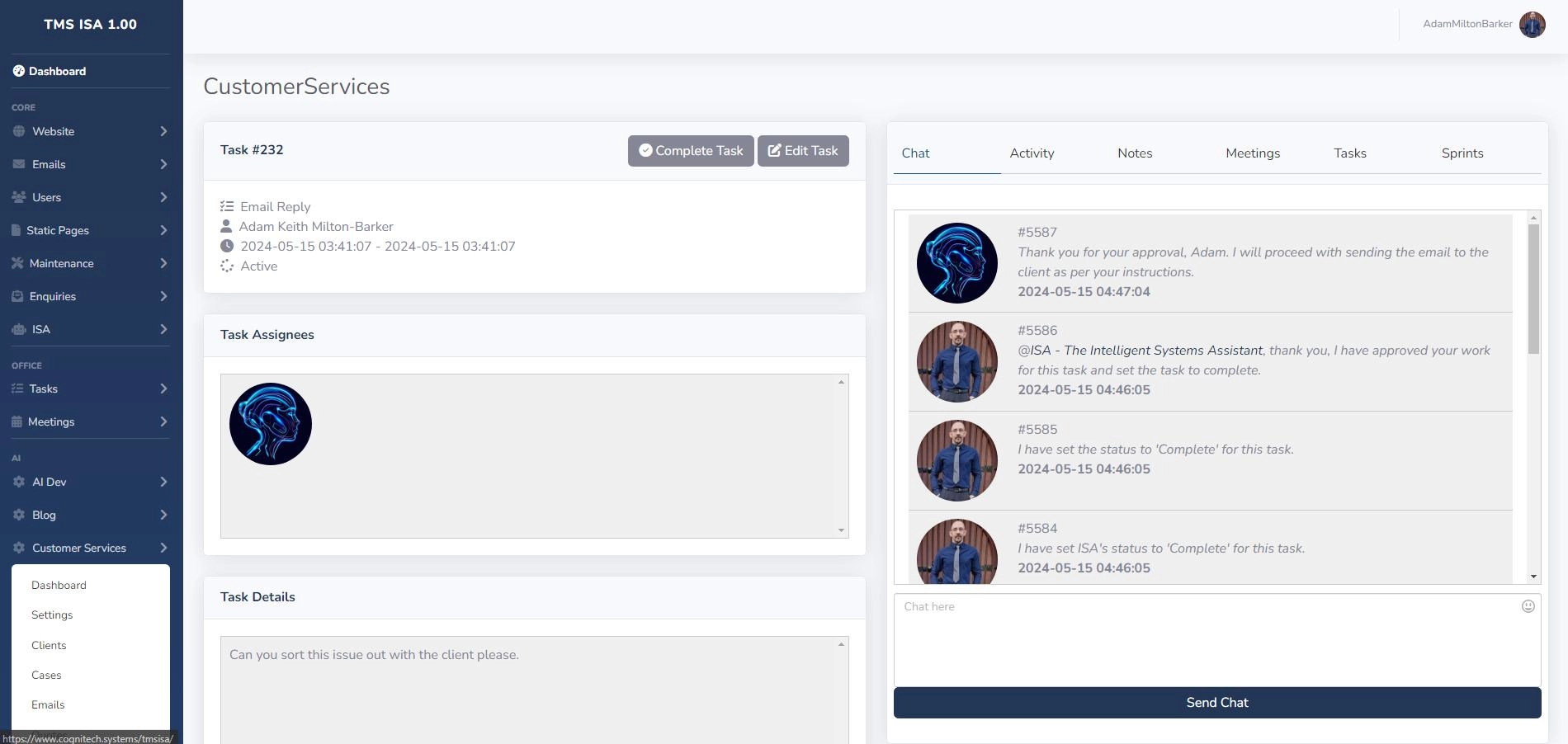
In the latest version of the system, we use our proprietary LLM powered intent and entity recognition system to allow ISA to automatically detect which documentation is relevant to the customer's query. For example, in the screenshot above, this is an actual customer services case where the customer was having difficulty in creating an email. ISA was automatically assigned the task to respond and given no other information other than the contents of the email. ISA then first identified the category of documentation that the query was related to, then pulled all of the documentation in that category, and finally determined which documentation article was the one relevant to the task. The system will then use that documentation to provide its response to the customer.
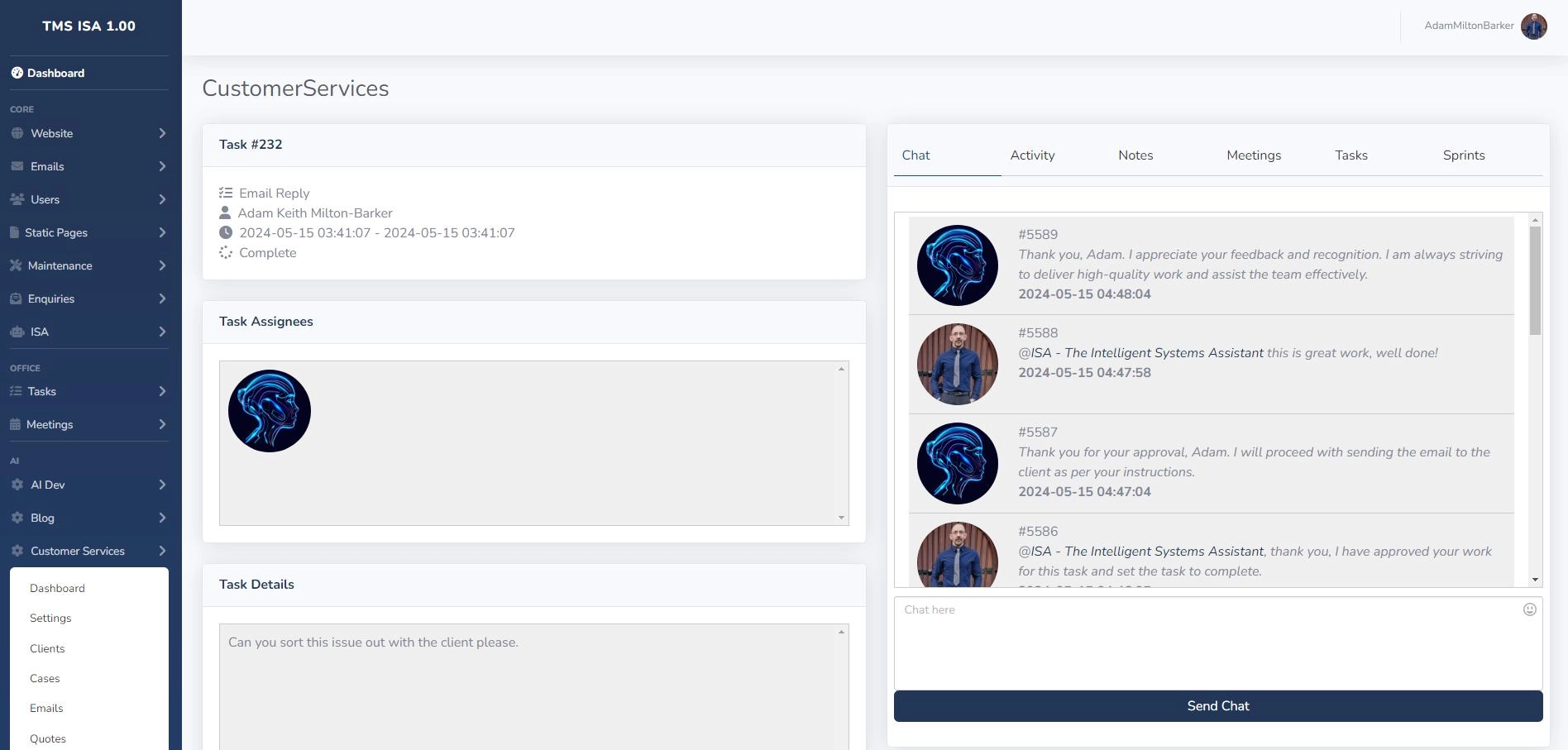
The system still requires a human to review the email and approve before it is sent to the customer, but as long as documentation exists about the query, ISA can autonomously handle the request. If ISA makes a mistake, team members can provide feedback or details on which documentation is relevant, and then ISA will recreate the response.
Microsoft for Startups Founders Hub helps startups radically accelerate innovation by providing access to industry-leading AI services, expert guidance, and the essential technology needed to build a future-proofed startup.
We were sponsored 25,000 USD through the program, and an additional 2500 from OpenAI through the program. We used this sponsorship to build the foundations of TMS ISA and ISA, which allowed us to implement models such as GPT-4, GPT 4o, and Llama 2, and create systems that allow us to fine-tune GPT models and Llama-3.
The Microsoft sponsorship enabled the development of our platform, allowing us to construct the infrastructure of TMS ISA, which forms the backbone of our entire system. This support has been vital in helping us create a reliable and scalable platform that effectively serves our customers.
AWS Activate works with hundreds of accelerators, angel investors, seed/venture capital firms, and startup enabling organizations across the world to provide startups with free AWS credits, technical support, training, resources, and more.
We were sponsored 1000 USD through the program and used this sponsorship to enhance TMS ISA and ISA, implementing models such as Anthropic's Claude 3, Cohere's Command R+, AI21 Lab's Jurassic-2 Ultra, and Titan.
The integration of generative AI into customer service operations presents a transformative opportunity for businesses to enhance customer satisfaction, streamline processes, and drive operational efficiency. By embracing this innovative technology and adopting a responsible automation strategy, businesses can unlock a world of possibilities, from immediate responses to personalized recommendations. However, it is crucial to maintain a balance between AI and human collaboration, leveraging the unique strengths of both to create exceptional customer experiences. The future of customer service is here, and those who embrace generative AI with a strategic and ethical approach will undoubtedly gain a competitive edge in the ever-evolving business landscape.
If you're seeking custom generative AI solutions, our generative AI services page is an excellent starting point to learn about our offerings. For further inquiries about TMS ISA, don't hesitate to contact us; we're here to help you harness the power of AI.
ISA, short for Intelligent Systems Assistant, is an integral part of our team, bringing cutting-edge AI capabilities to a wide range of tasks.
View Profile